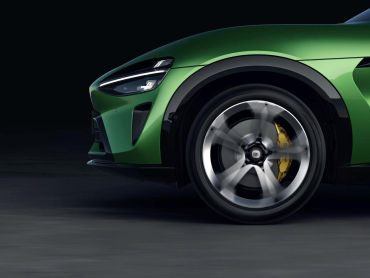
- Mobility Tech
Xiaomi Electric EV Draws 253,500 Orders, Challenges Tesla's Dominance
6 minute read

China’s electric vehicle market intensifies as Xiaomi’s new SUV shatters first-day sales records and undercuts Tesla’s pricing
Key Takeaways
- 289,000 orders in one hour for Xiaomi’s new YU7 electric SUV, priced at $35,000 and positioned as a direct Tesla Model Y competitor
- Tesla’s China market share drops to 7.6% in early 2025, down from 15% in 2020, as Chinese automakers intensify price competition
- Xiaomi stock surges 8% to record high following strong order response, with company valued at nearly $200 billion despite selling vehicles at estimated $10,000 loss per unit
Introduction
Xiaomi delivers a dramatic challenge to Tesla’s dominance in China’s electric vehicle market with the launch of its YU7 SUV, generating nearly 289,000 orders within an hour of opening reservations. The $35,000 electric SUV undercuts Tesla’s Model Y by $1,400 while offering superior range and features, marking the smartphone giant’s most aggressive move into automotive territory.
The explosive demand demonstrates the market’s appetite for Tesla alternatives as Chinese consumers embrace domestic brands. Xiaomi’s entry intensifies an already brutal price war that has compressed margins across China’s EV sector and forced established players to reassess their strategies.
Key Developments
Xiaomi unveiled the YU7 through Chinese social media platform Weibo, immediately triggering overwhelming consumer response. The company received over 200,000 preorders within three minutes, a milestone that previously took Tesla three months to achieve for comparable models.
Lei Jun, Xiaomi’s founder and CEO, expressed astonishment at the initial surge, stating on video: “My goodness, in just two minutes, we received 196,000 paid pre-orders and 128,000 lock-in orders.” The demand exceeded market expectations of around 100,000 orders and surpassed the company’s SU7 sedan launch performance by more than three times.
The YU7 offers three variants ranging from the Standard rear-wheel-drive model to the Max all-wheel-drive version priced at $46,000. All models utilize an 800V electrical platform enabling rapid charging that adds 385 miles of range in 15 minutes. The base model delivers 315 horsepower with 0-60 mph acceleration in 5.9 seconds, while the top trim produces 681 horsepower.
Market Impact
Xiaomi’s stock price surged 8% to record highs following the strong order response, closing up 4.39% on launch day. The company’s shares have more than tripled this year, valuing the Beijing-based firm at nearly $200 billion and making it the best-performing large-cap stock in Asia Pacific according to LSEG data.
Tesla faces mounting pressure as its China market share continues declining from 15% in 2020 to 7.6% in early 2025. The Model Y, previously China’s best-selling SUV, now confronts direct competition from the YU7’s superior specifications at a lower price point.
Chinese EV manufacturers including BYD, Nio, and Li Auto have responded with their own price adjustments, creating industry-wide margin compression. The competitive dynamics force Tesla to consider additional price cuts or enhanced features to maintain market position.
Strategic Insights
Xiaomi’s automotive strategy leverages its consumer electronics ecosystem to create integrated mobility solutions. The YU7 features HyperOS integration, Apple CarPlay connectivity, and AI-powered interfaces that Tesla currently lacks. This approach differentiates Xiaomi from pure automotive manufacturers by offering seamless device connectivity.
The company accepts significant short-term losses, with estimates suggesting $10,000 loss per vehicle sold. Citi Research projects that selling 60,000 units could generate $56 million in losses this year. However, Xiaomi’s $15 billion cash reserves and government backing enable sustained investment in market share acquisition.
Traditional automakers face disruption from technology companies bringing software expertise and ecosystem integration to vehicle development. This trend accelerates as Chinese policy makers emphasize domestic consumption of high-value goods including electric vehicles.
Expert Opinions and Data
Jefferies analysts note the YU7 offers “much better specs and performance” relative to its price compared to Tesla’s Model Y. The analysis highlights superior range capabilities, with the YU7 achieving 519 miles under China’s CLTC testing cycle versus Tesla’s Model Y Long Range variant.
Citi analysts suggest Tesla may need to offer its Full Self-Driving software for free and provide enhanced financing incentives to compete effectively. The pressure reflects broader industry recognition that Chinese competitors now match or exceed foreign brands in key performance metrics.
Xiaomi’s automotive division reported Q1 2025 revenue of $2.5 billion with an average selling price of $33,000 and gross margin of 23.2%. These figures demonstrate strong operational performance despite aggressive pricing strategies that prioritize market penetration over immediate profitability.
Conclusion
Xiaomi’s YU7 launch represents a pivotal moment in China’s electric vehicle market, demonstrating how technology companies can rapidly challenge established automotive leaders through superior features and aggressive pricing. The overwhelming consumer response validates the strategy while highlighting Tesla’s vulnerability in its second-largest global market.
The competitive landscape now features Chinese manufacturers capable of matching or exceeding foreign rivals’ technical capabilities while leveraging government support and ecosystem integration advantages. This dynamic creates sustained pressure on profit margins and market positioning across the industry.








